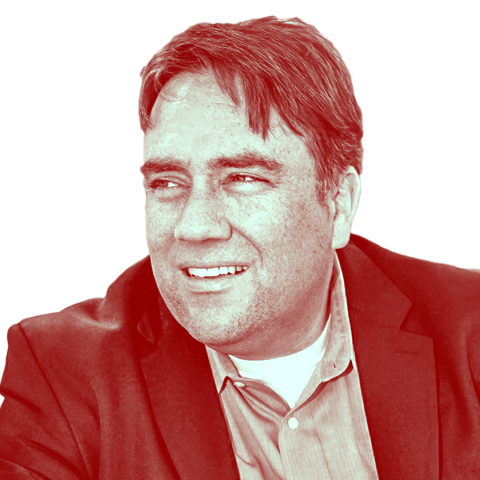
Governing the Internet from Rousseau’s hometown
If the internet is going to serve democracy around the world, it needs to have its own global government. Such a government could live online and have a real-world headquarters in Geneva, suggests our democracy columnist Joe Mathews.
Today’s methods for governing the Internet do not constitute a coherent system, much less a democratic one.
Instead, Internet governance is a contest for power between the most powerful tech companies, who put their shareholders first and want the Internet to be a free-for-all, and national governments, which prioritize the political interests of their own officials.
In this contest, both sides create the pretense of democracy. Facebook has created its own “independent oversight” boardExternal link of global experts, though it’s unelected, and chosen by Facebook. The European Union touts its tougher regulationExternal link of privacy and the Internet – but those regulators are also unelected, and impose their rules on people far from Europe.
Which is why the Internet needs a democratic government that operates beyond the reach of tech companies or national government. Such a system must be both local— to allow people to govern the Internet where they live – and transnational, just like the Internet itself.
There is as yet no clearly articulated vision of such a government, but there are many constituent pieces that could be mixed together.
Charter of Digital Rights
A Europe-based network of human rights organizations has developed a Charter of Digital RightsExternal link—Article 4, for example: “Every person has the right to freedom of speech and expression in the digital world” – that could be part of the constitution of an Internet government. The NetMundial InitiativeExternal link, developed in recent years with a strong push from the World Economic Forum and a previous Brazilian government, offers ideas for international governance of the Internet built around a council that mixes rotating and permanent members.
There are lessons to be learned from ICANNExternal link (the Internet Corporation for Assigned Names and Numbers), a somewhat democratic non-profit that successfully governed a narrow part of the Internet – the domain name system – with participation from more than 110 countries from 1998 to 2016.
An effective Internet government must be collective – because the Internet’s power, and commercial value, lies not in any individual user or data, but in the aggregation of users and data. In a must-read essay in Noema magazineExternal link, Matt Prewitt, president of the RadicalxChange FoundationExternal link, suggested structuring Internet governance not around individual data rights, but rather around a series of “data coalitions” – online unions that would give communities of users democratic authority.
“Data cannot be owned, but must be governed,” Prewitt wrote. “Data must be the subject of shared democratic decisions rather than individual, unilateral ones. This presents particular challenges for liberal legal orders that have typically centered on individual rights.”
A democratic government for the Internet
In a similar vein, I’d suggest that the Internet’s democratic government combine multiple forms of democratic governance.
The center of such a government should be a citizens’ assembly – a tool used around the world by countries and communities to get democratic verdicts that are independent of elites. This citizens’ assembly would consist of 1,000 people who, together, would be representative by age, gender, and national origin of the global community of Internet users. They would not be elected individually, but rather chosen via randomized processes that use sortition (or drawing lots).
The assembly would be supplemented by an online platform that allowed people to report problems, make suggestions, or even petition for proposals that could be voted upon by Internet users everywhere, in a global referendum. The models for such a platform include RousseauExternal link, the controversial online environment through which Italy’s Five Star Movement governs itself, and Decide MadridExternal link, the online participatory framework that has spread from the Spanish capital to more than 100 cities worldwide.
A real-word headquarter in Switzerland
National governments and tech companies would try desperately to influence this government, but they would not be in charge of it. And each citizens’ assembly would dissolve after two or three years – making it harder for the powerful to lobby it.
While the government would live online, it could have a real-world headquarters in the 18th century Swiss philosopher Jean Jacques Rousseau’s hometown of Geneva.
If such a government endured and succeeded, it could join the ranks of Swiss-based international organizations like the World Health Organization or the International Red Cross. It also could offer a model for international democratic governance to address off-line global problems, from public health to climate change.
Joe Mathews writes The Democracy Column for Zócalo Public SquareExternal link and swissinfo.

In compliance with the JTI standards
More: SWI swissinfo.ch certified by the Journalism Trust Initiative
















![The four-metre-long painting "Sonntag der Bergbauern" [Sunday of the Mountain Farmers, 1923-24/26] had to be removed by a crane from the German Chancellery in Berlin for the exhibition in Bern.](https://www.swissinfo.ch/content/wp-content/uploads/sites/13/2025/12/01_Pressebild_KirchnerxKirchner.jpg?ver=917ecbf2)















You can find an overview of ongoing debates with our journalists here . Please join us!
If you want to start a conversation about a topic raised in this article or want to report factual errors, email us at english@swissinfo.ch.